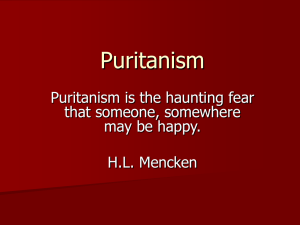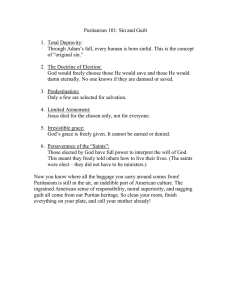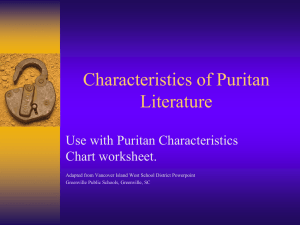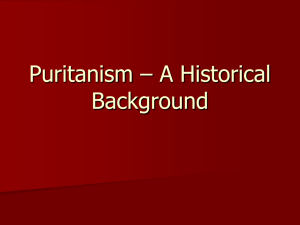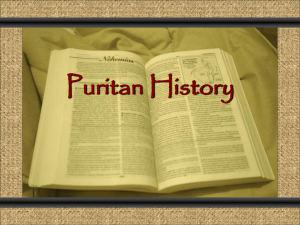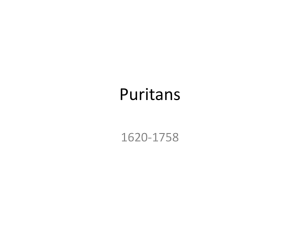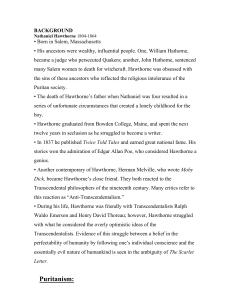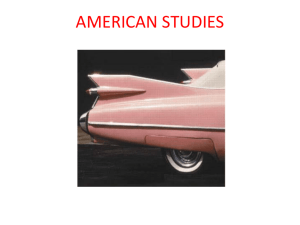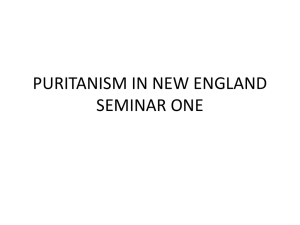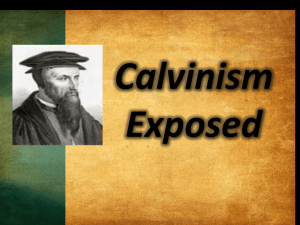Colonial Period, 1620
advertisement
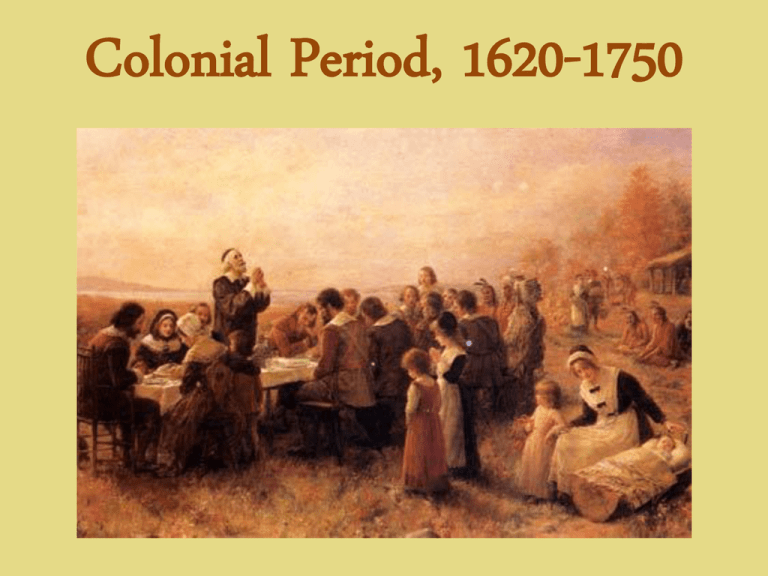
Colonial Period, 1620-1750 Focus Questions • How did religion affect the literature of the Colonial Period? • What aspects of Puritanism are visible in contemporary society? Calvinism: The Legacy of John Calvin (1509-1564) Calvin… • was a French theologian, pastor, & social reformer • is considered the founder of the Puritan ethic http://www.youtube.com/watch?v=vg2O0hZ5ChA Why leave England? • To purify or separate from the ‘corrupt’ Church of England • To seek religious freedom Pilgrims in Holland Arrival • The 1 colony was Roanoke, NC in 1585 – became st known as the lost colony. White returns in 1590 – “Croatoan” is marked on a tree. http://www.youtube.com/watch?v=-pFaJnvtOWU • The 2nd colony was founded at Jamestown, Virginia, in 1607. • The Pilgrims, founders of Plymouth, Massachusetts, arrived in 1620. http://www.youtube.com/watch?v=PoXHXbgRJvc&list=UUBoEhBRE9fnWKU4M1CBV1EQ&index=13&feature=plcp Jamestown, Virginia 1607 http://www.youtube.com/watch?v=vpA5O46Ioyk&feature=relmfu Toon Time The Colonies http://www.youtube.com/watch?v=qiMCXWMvRJc&feature=related Puritan Beliefs Total Depravity Unconditional Election Limited Atonement Irresistible Grace Perseverance of the "saints" Total Depravity depravity – moral corruption or degradation • Through Adam and Eve’s fall, every person is born sinful. • This is closely linked to original sin. Unconditional Election • God saves those he wishes. Only a few are selected for salvation and not based on their own merit. • This is the concept of predestination. Limited Atonement • Jesus died for the chosen only, not for everyone. Irresistible Grace grace – the saving & transfiguring power of God • God’s grace is freely given; it cannot be earned or denied. Perseverance of the “Saints” • Those elected by God have full power to interpret the will of God & to live uprightly. • If anyone rejects grace after feeling its power in his life, he will be going against the will of God – something impossible in Puritanism. Summary Thus, if one is born a slave to sin and spiritually dead--is TOTALLY DEPRAVED or spiritually unable--then salvation must ULTIMATELY be a free or UNCONDITIONAL gift, in no way finally dependent or contingent on one's actions--back to the "U" or UNCONDITIONAL ELECTION. Puritan Beliefs Strong work ethic Hard day’s work brought joy to a man’s heart Bible shunned laziness: “if anyone does not want to work, let him not eat.” Gambling, dancing, etc. not condoned—works that lead to sin Daily Life The Puritans… • believed that God was working in their daily lives. • would “search” their daily lives in order to find any symbols from God. • were educated and taught their followers to be rational thinkers. • believed in effective business practices. • feared that humanistic learning would draw people away from the church. Puritans in action… http://www.youtube.com/watch?v=Buri1SXh1eU Funny Page Puritan Writers • Wanted to transform a mysterious God – mysterious because he is separate from the world • Wanted to make Him more relevant to the universe William Bradford • In 1620 William Bradford came with a group of individuals from Europe and formed Plymouth Plantation. • In the fall of that year there were 101 men, women, and children present. By the spring of 1621 there were only 50 survivors. Colonial (Puritan) Literature Types: • Journals • Histories • Sermons • Poetry Style: • plain • Religious • Purpose-driven • Some used metaphorical language Themes: • Idealism – both religious & political • Practicality • Sin • Isolation • Salvation Focus Your Reading… • How did religion affect the literature of the Colonial Period? • What aspects of Puritanism are visible in contemporary society?
